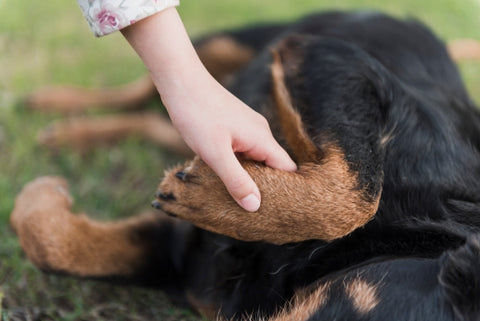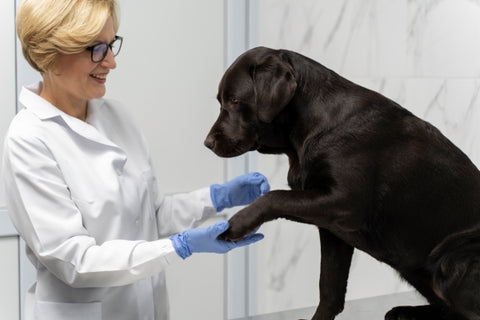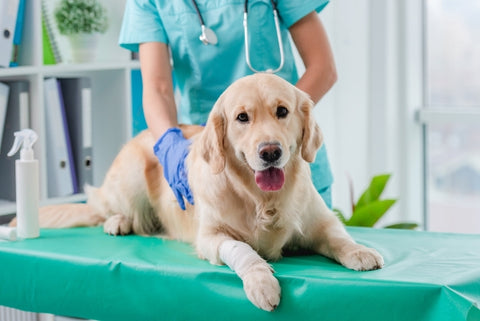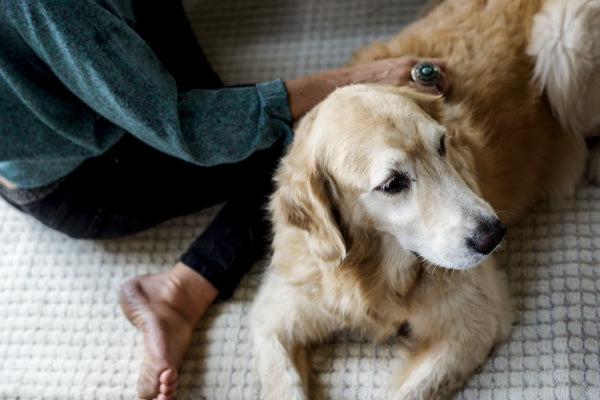Has your dog suddenly become unable to climb stairs as energetically as before? Naturally, older dogs may not expend as much energy as younger ones. This makes it trickier to spot hip problems in them as quickly as you would in a young pup.
Hip issues are primarily the result of injuries (hip dislocation) or aging and are obvious in the dog's daily activities. Besides these, we can also attribute hip issues to low nutrients in the diet, systemic inflammation, weight gain, and allergies causing autoimmune disorders. The most typical solution is a healthy diet and joint supplements, but surgery is sometimes the answer.
Working to eliminate pain in the dog’s hips requires a proper diagnosis from a primary care veterinarian. We will review some typical signs to look out for as a dog owner and things you can do to strengthen the dog’s joints. So, here’s our take on the dog’s hip pain and the proper treatment needed to nurse them back to health:

Hip Problem or Hip Dysplasia
Whether it is an injury or hip dysplasia, such conditions take away energy, especially in senior dogs. Both are treatable with the proper medical management. However, you must determine if it is an injury or a more delicate problem.
Canine hip dysplasia occurs as dogs grow, causing laxity of the hip joint. That results in limp dysfunction and hip pain. Although a loose hip joint can be more pronounced in large breed dogs, it can also affect dogs of other sizes.
Left unmanaged, canine hip dysplasia can cause muscle atrophy, arthritis (degenerative joint disease), and limited mobility. That is when severe cases might call for total hip replacement. Hence, you must always prioritize your dog’s health and wellness.
Signs of Hip Dysplasia and Challenges
The following are typical signs of hip dysplasia and other challenges in dogs:
Limping
Dogs with hip dysplasia will start limping as the socket joint laxity continues. It is one of the most easily recognizable signs of hip challenges. However, an injured paw might also cause your four-legged companion to start limping.
This condition affects exercise routines, limiting your dog’s activity level. Hence, it is worth immediate investigation and treatment.
Bunny Hopping
Instead of running as he should, your dog starts bunny-hopping. That involves lifting both hind legs simultaneously. A condition like that could signify the dog’s effort to shift the load from one leg to both hind legs.
Struggling to Stand Up After Lying Down
Do you remember how energetic your dog was when you first adopted it? He would quickly rise with energy. If getting up becomes a challenge, you should visit the vet.
We agree that adult dogs will experience mobility problems naturally. However, you should watch out for signs of pain.
Reluctance in Exercising
Dogs with hip dysplasia show a reluctance to exercise. The morning walk no longer excites them, instead they might sneak into bed.
This reluctance is one of the early signs of hip challenges. Nevertheless, you must look out for other supporting signs. A sudden change in routine and anxiety can affect the dog’s response to exercising, even though they have good joint health.

Swollen Joints
Dogs with hip dysplasia may have swollen joints. They may also flinch when touched in sensitive areas where they experience joint or hip pain. Consult a vet if this condition continues regularly.
Pops or Cracks During Movement
While popping or cracking in the joints while moving does not indicate discomfort, it can be a severe symptom of hip dysplasia in dogs.
Watch out for displays of significant pain if this happens to your dog. No discomfort means your dog is not in danger of developing hip dysplasia.
Loss of Muscle Mass
Most dogs that develop hip dysplasia will lose muscle mass in their hind legs. Close observation is often enough to detect it. Nevertheless, back it up with other symptoms before deciding whether it is hip dysplasia.

Visiting the Vet
Diagnosing hip dysplasia must be confirmed medically. Hence, dog owners should visit the vet when their dogs develop clinical signs of the condition. We’ve listed a few above to give you a head start.
The veterinary doctor may perform the following to get hip dysplasia diagnosed:
- An X-ray of the dog’s hips
- A check up on the hip joint laxity
- An exam of the blood chemical profile
These are essential in determining the causes and the appropriate steps to treat hip dysplasia.
Treating hip dysplasia may require total hip replacement or surgery. We can say the same about severe injuries that cause similar discomfort. We always advise dog owners to seek medical help before self-diagnosing.

How to Manage the Hip Problem in Your Dog
Your veterinary doctor will prescribe medication to alleviate the joint pain or slow down the hip dysplasia. Nevertheless, you can practice or incorporate a few things to cushion joint pain and boost overall joint health.
Here are things you can do to strengthen your dog’s joints and hips:
Physical Therapy
Gentle stretches and targeted movement can be helpful to the hip joints, helping improve mobility. These include activities such as underwater treadmills and hydrotherapy. However, avoid physical therapy if your dog experiences chronic hip pain.
The vet should sign off on any physical therapy program for your dog. Then, you can find a reputable dog therapist in your area.
Healthy Diet
Hip joints, ligaments, and bones need vitamins, healthy fats, and minerals to grow. Your dog will feel weak if it doesn’t get a good supply of them.
Whole meats are essential sources of vitamins, healthy fats, amino acids, and minerals. They should be on your dog’s diet plan.
Supplements
Pet parents know the importance of supplements. Your dog needs them to help maintain joint health and development.
Food is essential, and adding high-quality supplements to your dog’s diet can help the dog’s quality of life.
Popular supplements you can add include the following:
- Glucosamine for dogs
- MSM
- Turmeric
- Omega 3
At PetHonesty, we are passionate about ultilziing supplements to give dogs the best results. That includes the brain, bones, joints, immune system, and furs.
Ease Movement in the House
Eliminating difficult situations that strain your dog while moving around the house can help manage joint discomfort. You can add ramps to help them move up to the couch, bed, cars, etc.
Also, keep the house warm, as cold weather stiffens joints, causing hip pain. Your vet will also provide advice on changes you can make.
Weight Control
Your dog’s weight management is essential, even when it has yet to experience hip pain or discomfort. A healthy weight keeps dogs energetic, and they’ll have no problem running up or down the stairs unless there is a health issue.
Ensure your dog is neither overweight nor overly lean. Maintain a healthy eating schedule and ensure each meal has adequate nutrients. As explained in the previous section, use supplements to back up the foods.

Commonly Affected Breeds with Hip Dysplasia
German Shepherds are more prone to developing hip dysplasia as they are giant breed dogs. Other breeds include golden retrievers, labradors, English and French bulldogs, Great Danes, Saint Bernards, Burmese mountain dogs, and Mastiffs.
Dog owners with these breeds should pay closer attention to any indication of pain. Take steps immediately if you see signs of hip pain.
Final Thoughts
Hip discomfort may arise from injury or strenuous activity. However, your dog should recover quickly once treated or adequately rested.
Hip dysplasia, on the other hand, is a developmental issue between the femur bone and the hip socket. It becomes more pronounced as the dogs grow. If not adequately managed, dogs suffering from it can become lame.
Lifestyle changes and physical therapy are non-surgical solutions to treating hip discomfort. However, surgery might be needed in extreme cases to save the dog from becoming lame. That is why it is essential to visit the vet if your dog shows signs of it.

Camille is a co-founder of PetHonesty and VP of Pup Parent Education. After watching her own family dog suffer from joint issues for years she became passionate about improving dogs' quality of life. With the help of a team of veterinarians and dog nutritionists she now helps educate other dog owners about the small but powerful things they can do to positively impact their dogs' health and wellness! She lives in Austin, TX and loves cuddling puppies, being outside and reading.













